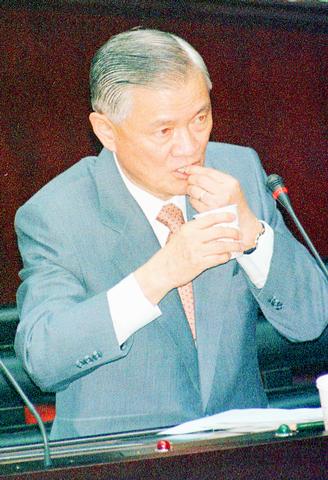Premier Tang Fei (
"The Fourth Nuclear Power Plant's reactors are reasonably safe ? We should therefore continue the project, identify appropriate supportive measures at the same time and suspend operation of the first and second plants, which are less safe," Tang said, adding that alternatives mooted by the Ministry of Economic Affairs were not without flaws.
Meanwhile, an official from the Presidential Office said that President Chen Shui-bian (

PHOTO: LEE HONG-MING, TAIPEI TIMES
"Though the president's opinion differs from that of Tang on the Fourth Nuclear Power Plant," said acting secretary-general of the Presidential Office Chen Che-nan (
Chen Che-nan stressed that the president would support the Cabinet without reservation, but refused to confirm whether he discussed the issue with Tang last week.
Although Tang has previously said that the Cabinet would come up with a final decision by the end of October, he has repeatedly expressed his personal preference for continuing the project. He further argued yesterday that carbon dioxide generated by the use of natural gas would accelerate the build-up of greenhouse gases, which, in his view, "was no less harmful than nuclear power."
Tang added that "nuclear power may not be an absolutely safe option, but it poses less risk."
The DPP's legislative caucus was quick to condemn him.
"If Tang decides to continue the project, he will simply have to step down," legislator and veteran anti-unclear activist Lai Chin-lin (
Party caucus convener Hsu Tien-tsai (
"The DPP will adopt every means at its disposal including urging the Presidential Office, party headquarters, the legislative caucus and the Cabinet to prevent Tang's announcement," Hsu added.
"The ultimate goal for the ruling party is to stop the project, keep Tang in his post and talk him into dropping the idea of continuing the plant's construction," said Legislator David Chou (
Chen Che-nan, however, also asked reporters at yesterday's press conference not to continually discuss the question of whether Tang would quit, saying that the president still regarded him as the best choice to lead the Cabinet.
"The president communicates well with the premier," the Presidential Office spokesman said, "and it is neither fair nor polite to continually question Tang's position."
New Party Legislator Lai Shyh-bao (賴士葆) accused the president and premier of adopting a "good cop, bad cop" strategy and predicted that the new government would ultimately proceed with the plant's construction.
"President Chen plays the `good cop' by maintaining his anti-nuclear stance to satisfy his supporters," Lai said. "Premier Tang, as a KMT member who is unlikely to seek election for office in the future, takes the part of `bad cop.'"

MAKING WAVES: China’s maritime militia could become a nontraditional threat in war, clogging up shipping lanes to prevent US or Japanese intervention, a report said About 1,900 Chinese ships flying flags of convenience and fishing vessels that participated in China’s military exercises around Taiwan last month and in January last year have been listed for monitoring, Coast Guard Administration (CGA) Deputy Director-General Hsieh Ching-chin (謝慶欽) said yesterday. Following amendments to the Commercial Port Act (商港法) and the Law of Ships (船舶法) last month, the CGA can designate possible berthing areas or deny ports of call for vessels suspected of loitering around areas where undersea cables can be accessed, Oceans Affairs Council Minister Kuan Bi-ling (管碧玲) said. The list of suspected ships, originally 300, had risen to about

DAREDEVIL: Honnold said it had always been a dream of his to climb Taipei 101, while a Netflix producer said the skyscraper was ‘a real icon of this country’ US climber Alex Honnold yesterday took on Taiwan’s tallest building, becoming the first person to scale Taipei 101 without a rope, harness or safety net. Hundreds of spectators gathered at the base of the 101-story skyscraper to watch Honnold, 40, embark on his daredevil feat, which was also broadcast live on Netflix. Dressed in a red T-shirt and yellow custom-made climbing shoes, Honnold swiftly moved up the southeast face of the glass and steel building. At one point, he stepped onto a platform midway up to wave down at fans and onlookers who were taking photos. People watching from inside

Japan’s strategic alliance with the US would collapse if Tokyo were to turn away from a conflict in Taiwan, Japanese Prime Minister Sanae Takaichi said yesterday, but distanced herself from previous comments that suggested a possible military response in such an event. Takaichi expressed her latest views on a nationally broadcast TV program late on Monday, where an opposition party leader criticized her for igniting tensions with China with the earlier remarks. Ties between Japan and China have sunk to the worst level in years after Takaichi said in November that a hypothetical Chinese attack on Taiwan could bring about a Japanese

The WHO ignored early COVID-19 warnings from Taiwan, US Deputy Secretary of Health and Human Services Jim O’Neill said on Friday, as part of justification for Washington withdrawing from the global health body. US Secretary of State Marco Rubio on Thursday said that the US was pulling out of the UN agency, as it failed to fulfill its responsibilities during the COVID-19 pandemic. The WHO “ignored early COVID warnings from Taiwan in 2019 by pretending Taiwan did not exist, O’Neill wrote on X on Friday, Taiwan time. “It ignored rigorous science and promoted lockdowns.” The US will “continue international coordination on infectious